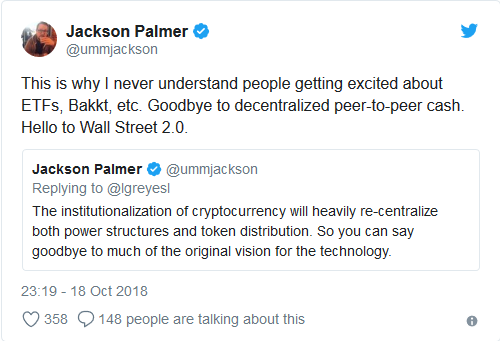Dogecoin's Creator Implies Institutional Money Could Turn Crypto Into ‘Wall Street 2.0’

This week, Dogecoin creator Jackson Palmer made a few Twitter posts about the dangers of institutional money rushing into the cryptocurrency industry, saying that it could lead to the development of a "Wall Street 2.0."

The discussion was sparked when one of Palmer's followers asked why he was apprehensive about Bakkt, a cryptocurrency market that will soon be launched by the New York Stock Exchange.
In response, Jackson tweeted: Palmer went on to point out that 1% of wallets control more than 55% of all circulating bitcoin, and speculated that institutional investors will cause the supply to be even more centralzed. Jackson said.
"The institutionalization of cryptocurrency will heavily re-centralize both power structures and token distribution. So you can say goodbye to much of the original vision for the technology."
Wall Street and Crypto
After years of criticizing and dismissing blockchain technology and cryptocurrencies, banks, governments, and traditional financial organizations are beginning to take the technology seriously. Some high profile figures on Wall Street have even left their positions to run cryptocurrency firms of their own.
While the platforms that most cryptocurrencies run on are open source, Bank of America CEO Brian Moynihan recently claimed that the company has more patents than anyone else in the blockchain space. In an interview with Yahoo Finance at this year's World Economic Forum in Davos, Switzerland, Moynihan said, “We have more patents, I think, than almost anybody in blockchain.” Palmer's comments highlight a growing divide in the cryptocurrency community, regarding trust in traditional financial institutions.
Many early adopters see cryptocurrency as an alternative, competitor, and eventual successor to Wall Street.
In fact, many of these early adopters were initially drawn to the technology out of frustration and mistrust with the banking institutions that they blamed for the financial crash of 2008. Meanwhile, investors seeking to cash in on cryptocurrency markets, tend to be discouraged by the "wild west" reputation that the industry has developed. These investors feel more comfortable with regulated exchanges and branded institutional platforms.
I wrote this article @cryptoglobe
There's already a split mentality when it comes to blockchain and crypto. Some believe in the science behind it and the ways it could change the world, and some see it as a way to make profit.
It's basically Wall Street 2.0 already... Just the beta version.
I see the same dangers. Even with most of the people in the crypto community, they are buying it and hoping the price will go up instead of using it as peer-to-peer cash.
I'll be doing what I can to make real transactions with crytpo and to encourage others to buy and sell with it, too.
It's a double edged sword. On one hand this could bring mass adoption of crypto. and on the other hand it could lead to mass centralization of crypto. But at least there are projects like monero to fall back onto either way.
Congratulations @johnvibes! You have completed the following achievement on the Steem blockchain and have been rewarded with new badge(s) :
Click on the badge to view your Board of Honor.
If you no longer want to receive notifications, reply to this comment with the word
STOPDo not miss the last post from @steemitboard:
perhaps that's just certain transitional stage in typical "P-R-S" scheme / plan? 😉
that impression I'm getting sometimes from reading the news and how things proceed with Crypto, especially regarding regulations, all the FUD / FOMO and now this - "Wall Street 2.0" LOL
perhaps they've pre-planned all this ever since 2009 ? (whitepaper of BTC) and then kept stirring emotions up as in this documentary in 2011:
or even before that, say, since "Crypto Manifesto" some 30 years ago, back in 1988 - coincidentally the same year when Economist published its "prediction" for this year 2018 ? 😶